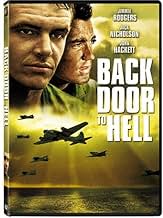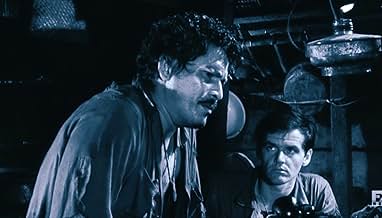AVALIAÇÃO DA IMDb
5,2/10
956
SUA AVALIAÇÃO
Durante a Segunda Guerra Mundial, uma equipe de comando de três homens deposita sua confiança nas mãos de um grupo de resistentes filipinos, enquanto eles tentam destruir um centro de comuni... Ler tudoDurante a Segunda Guerra Mundial, uma equipe de comando de três homens deposita sua confiança nas mãos de um grupo de resistentes filipinos, enquanto eles tentam destruir um centro de comunicação japonês.Durante a Segunda Guerra Mundial, uma equipe de comando de três homens deposita sua confiança nas mãos de um grupo de resistentes filipinos, enquanto eles tentam destruir um centro de comunicação japonês.
- Direção
- Roteiristas
- Artistas
Avaliações em destaque
I am not a great fan of Monte Hellman's films, but they were a witness of the seventies period. This small budget war flick is worth seeing for the directing skills, and the early perfomance of Jack Nicholson. For the rest, it's just another war film, taking place in the Philippines during WW2. Predictable, with no real unforgettable scenes, the short length provides more intensity in this plot which is not that surprising. The result is a sharp and tense story, with enough action scenes to entertain. And Monte Hellman, no matter my taste, is an iconic film maker from the seventies, this movie not his most famous though, but still worth viewing.
One time pop singing star Jimmy Rodgers is teamed with a VERY young Jack Nicholson, in this tale of three Intel-recon rangers, landing in the Phillipines, just prior to McArthur's return. This is an early directorial effort by Monte Hellman, and combined with the young cast, and several Phillipino actors there is a sense of awkwardness to the film that actually lends to its authenticity. The story, centered on knocking out a Japanese communication center is simple, the dialogue terse. Theatre owner/producer Lippert is credited as an executive producer, and the film is reminscent of his earlier release "Silent Raiders" (1954). Worth a look, just to see a young Nicholson, honing his craft.
'Back Door to Hell' is much better war film that one can expect from low budgeted B-movie. Little rough on the edges, but well put together with good story, enough tension and enough meaty characters to care for till to the end. The big battle in the end is cut together from stock footage, but that shouldn't come as a big shock.
Three men reconnaissance unit with hardened cynical sergeant Jersey (John Hackett) and philosophical wise cracker Burnett (Jack Nicholson) led by lieutenant Craig (played by pop singer Jimmy Rodgers who also was one of the financial backers), are on the mission in Luzon, Phillipines to gather information about the movements of Japanese troops prior to American invasion. Team must meet with guerrilla leader Miguel, but they find new leader Paco (Conrad Maga) instead, and learn that Miguel has been killed off by Paco himself. No certain explanation is given, except Paco's ambiguous answer, that you can't trust people during the occupation.
'Back Door to Hell' is not your typical anti-war film, nor 'we are the awesome heroes' type action piece. The film has a little existential and philosophical point of view, but it rather just depicts the war and its horrors. All this is enlivened by the location of Philippines.
The film didn't get much praise upon its release, and it is rather forgotten today, except when someone points it out as one of the earliest roles of Jack Nicholson (whose performance alone is definitely the reason to check out the film). But there are much more in that film. You can say that 'Back Door to Hell' is a film with personality.
Many great lines come from Jack Nicholson's character, but my favorite one is his answer to Jersey, when he asks: "We're all gonna die anyway - tomorrow, next week, 30 years from now. Did that little thought ever penetrate your thick skull?" And Burnett retorts: "Yeah, once when I was a boy, but naturally I dismissed it as being too outrageous."
P.S. Can anyone confirm, was it Japanese/American character actor Mako Iwamatsu in the role of captured Japanese soldier?
Three men reconnaissance unit with hardened cynical sergeant Jersey (John Hackett) and philosophical wise cracker Burnett (Jack Nicholson) led by lieutenant Craig (played by pop singer Jimmy Rodgers who also was one of the financial backers), are on the mission in Luzon, Phillipines to gather information about the movements of Japanese troops prior to American invasion. Team must meet with guerrilla leader Miguel, but they find new leader Paco (Conrad Maga) instead, and learn that Miguel has been killed off by Paco himself. No certain explanation is given, except Paco's ambiguous answer, that you can't trust people during the occupation.
'Back Door to Hell' is not your typical anti-war film, nor 'we are the awesome heroes' type action piece. The film has a little existential and philosophical point of view, but it rather just depicts the war and its horrors. All this is enlivened by the location of Philippines.
The film didn't get much praise upon its release, and it is rather forgotten today, except when someone points it out as one of the earliest roles of Jack Nicholson (whose performance alone is definitely the reason to check out the film). But there are much more in that film. You can say that 'Back Door to Hell' is a film with personality.
Many great lines come from Jack Nicholson's character, but my favorite one is his answer to Jersey, when he asks: "We're all gonna die anyway - tomorrow, next week, 30 years from now. Did that little thought ever penetrate your thick skull?" And Burnett retorts: "Yeah, once when I was a boy, but naturally I dismissed it as being too outrageous."
P.S. Can anyone confirm, was it Japanese/American character actor Mako Iwamatsu in the role of captured Japanese soldier?
World War II has probably been the most focused-on topic in cinema. Practically every genre has depicted the six-year global conflict. There's no shortage of famous movies about it - I recently saw "A Bridge Too Far" - but there are also the lesser known movies. Monte Hellman's "Back Door to Hell" is an example. It depicts some US troops (one of them played by a young Jack Nicholson) scoping out the Japanese-occupied Philippines to prepare for a US invasion. Joining up with some locals who are waging a guerrilla war against the occupiers, the US troops soon find out that this is no time to play fair.
It's no masterpiece, but still a good focus on how it's hard to be the "good guy" in a desperate situation. I understand that all sides flouted the Geneva Conventions during WWII. And it turned out to not even be the last war ever fought.
Anyway, interesting movie.
It's no masterpiece, but still a good focus on how it's hard to be the "good guy" in a desperate situation. I understand that all sides flouted the Geneva Conventions during WWII. And it turned out to not even be the last war ever fought.
Anyway, interesting movie.
Hollywood has frequently (and variably) dealt with the WWII Pacific conflict: this is another such film, for which 'indie' director Hellman managed to secure the backing of a major studio, Twentieth-Century Fox (though the end result being just 69 minutes long, it was clearly sold as a 'programmer'). Anyway, Hellman's talent for introspection is even more evident (in an otherwise slightly-plotted effort) than before, with the emphasis on characterization (pertaining especially to the initial-distrust-which-develops-into-mutual-respect between the different races involved)...though the action, whenever the film resorts to it, is sufficiently well-handled.
Jack Nicholson co-stars as one of a trio of American soldiers who arrive by raft to the Philippines in anticipation of the imminent Allied invasion of Japan. Though good as always, and already displaying his chameleon-like abilities, the role (joker, radio operator and Japanese interpreter all rolled into one!) does not allow him to shine like he did in the simultaneously-shot FLIGHT TO FURY (1964), another Hellman collaboration. The chief reason for this has to do with the fact that the central figures here are Nicholson's conscientious superior (a youthful-looking but undeniably effective Jimmie Rodgers) and the dehumanized leader of the rebel army (imposingly played by Gerald Maga).
The third member of the outfit, then, is blood-thirsty John Hackett (who co-wrote the film!), while the locals also number among them a strong-willed girl who became attached to Maga after he lost his family during the early days of the war. The two units clash over the treatment to be accorded some Japanese officers they capture, but soon they are fighting them side by side: the Americans' radio having been rendered useless in a skirmish, the trio then decide to infiltrate the enemy camp in order to send word back home that their mission is accomplished. Caught in the act, however, Nicholson succumbs to a hail of bullets and, when the two groups eventually reconvene, the girl tells Rodgers that Maga has fallen as well!
Though reasonably impressive as a cinematic exercise, the general tone proves rather too low-key for the film to be properly gripping as a whole. Besides, the overall pace is decidedly leisurely (consequently feeling longer than its running-time would suggest!), while the overly familiar situations that unfold throughout do not exactly help make it a distinguished example within such a prolific genre.
Jack Nicholson co-stars as one of a trio of American soldiers who arrive by raft to the Philippines in anticipation of the imminent Allied invasion of Japan. Though good as always, and already displaying his chameleon-like abilities, the role (joker, radio operator and Japanese interpreter all rolled into one!) does not allow him to shine like he did in the simultaneously-shot FLIGHT TO FURY (1964), another Hellman collaboration. The chief reason for this has to do with the fact that the central figures here are Nicholson's conscientious superior (a youthful-looking but undeniably effective Jimmie Rodgers) and the dehumanized leader of the rebel army (imposingly played by Gerald Maga).
The third member of the outfit, then, is blood-thirsty John Hackett (who co-wrote the film!), while the locals also number among them a strong-willed girl who became attached to Maga after he lost his family during the early days of the war. The two units clash over the treatment to be accorded some Japanese officers they capture, but soon they are fighting them side by side: the Americans' radio having been rendered useless in a skirmish, the trio then decide to infiltrate the enemy camp in order to send word back home that their mission is accomplished. Caught in the act, however, Nicholson succumbs to a hail of bullets and, when the two groups eventually reconvene, the girl tells Rodgers that Maga has fallen as well!
Though reasonably impressive as a cinematic exercise, the general tone proves rather too low-key for the film to be properly gripping as a whole. Besides, the overall pace is decidedly leisurely (consequently feeling longer than its running-time would suggest!), while the overly familiar situations that unfold throughout do not exactly help make it a distinguished example within such a prolific genre.
Você sabia?
- CuriosidadesA bicycle and a wheelchair were used in place of camera dollies on this film.
- Erros de gravaçãoWhen the Filipino actors speak in their native tongue it is Tagalog but people around Lingayen Gulf speak Pangasinan, a different dialect. However, it should be noted that Tagalog is the official language of the country.
Principais escolhas
Faça login para avaliar e ver a lista de recomendações personalizadas
Detalhes
- Tempo de duração
- 1 h 15 min(75 min)
- Cor
- Mixagem de som
- Proporção
- 1.85 : 1
Contribua para esta página
Sugerir uma alteração ou adicionar conteúdo ausente























